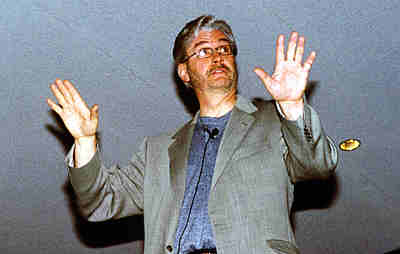General Board of Global Ministries
![]()
UM Information
UM
Reporter
![]()
Florida Southern College
![]()
Bethune
Cookman College
![]()
FL UM Children's Home
![]()
|
|
Training weekend helps churches bridge gaps |
|
Photo by Michael Wacht |
| "We're living in a world that's not 'tell me' anymore...now it's
'kiss me,' " said Leonard Sweet, the keynote speaker at this year's Discipleship Weekend. Sweet told participants that ministry to the younger generations has to touch them physically and/or spiritually to succeed. |
|
By Michael Wacht
LEESBURG — "God’s going to be in the future, whether we are or not," said the Rev. Leonard Sweet, author and church consultant on the postmodern age. "If God so loved the world why can’t we? Why can’t the church? Why are we trying so hard to get out of something God is trying so hard to get into — the world?" Using humor and personal illustration, Sweet, who is a member of the West Virginia Annual Conference and dean of the Theological School at Drew University in Madison, N.J., told the 630 laity and clergy attending this year’s Discipleship Weekend here that they need to start thinking differently if they want to reach postmodern generations. Often referred to as Generation X, or Gen Xers, and Millennials, postmodern generations follow the Baby Boomers and are people born after 1962. Discipleship Weekend is a two-day training event sponsored by the Florida Conference Council on Ministries that is designed to provide ministry training for church leaders and teachers. The people born before 1962 are "living in a world where a whole new generation is wired different from us," Sweet said, adding this year’s Lovebug computer virus is an example of how the world has changed. The Lovebug computer virus attacks e-mail programs, destroys computer files and steals computer passwords. On May 4, it spread to computer systems around the world in less than 24 hours, crippling more than 45 million computers and causing billions of dollars in lost data and repair time, according to the British Broadcasting Corporation. A Filipino college student is believed to have written and released the virus. "A teenager in a poor, remote part of the planet writing a project for college can have the impact that only nation-states could have had when I was growing up," Sweet said. "$50 billion in damage. That’s war." In order for the church to be relevant to new generations Sweet said it has to learn new ways of sharing the story of Jesus Christ. Music, he said, is an example of changing communication styles. To illustrate that point, Sweet showed video clips of three songs. He said they were examples of the same message that has changed over the years to appeal to and reach successive generations. "Tell Me the Stories of Jesus," from his mother’s generation, is slow and "very doctrinal," he said. "Tell Me" by the Gaither Vocal Band is popular among people born between 1946 and 1962. It is more upbeat and complex with lyrics that are relational and rich in metaphors, according to Sweet. The final song, "Kiss Me," by Christian folk band Sixpence None the Richer, appeals to the postmodern generations. "We’re living in a world that’s not ‘tell me’ anymore," Sweet said. "They’ve been told enough. ‘Kiss me’… it’s a relationship that goes even to the point of touching someone with the gospel of Jesus Christ. St. Augustine described Jesus as God’s kiss." Classes offer practical advice While Sweet’s keynote addresses set the tone for the weekend training event, a variety of classes provided practical advice on how to meet the challenges Sweet described. The Rev. Dale Locke, pastor of Community of Hope United Methodist Church in West Palm Beach, taught "Servant Evangelism — Kindness in Action!" which highlighted why and how to do servant evangelism. Servant evangelism is sharing the gospel of Jesus Christ through acts of kindness and service, such as cleaning restrooms for local businesses, handing out sodas or water, or washing cars for free. Despite people’s perceptions of evangelists as "angry and confrontational or weak scavengers," Locke said an evangelist is "a friendly, openhearted person." Reminding participants of Sweet’s advice that post moderns want to experience the gospel rather than hear it, Locke said servant evangelism "more closely models the words and deeds of Jesus." "As a father, my children don’t just want my words, they want me," he said. "The issue is not head-to-head evangelism, but heart-to-heart evangelism. It’s not information, it’s transformation." Locke also said evangelism is a process, and it takes between 12 and 22 positive encounters with the gospel for unchurched people to become believers. In his class on making youth ministry welcoming to neighborhood kids, the Rev. Roy Terry, pastor of Cornerstone United Methodist Church in Naples, said reaching young people is a matter of balancing hospitality and discipline. "We’re not called to be wimps, we’re called to be hospitable," he said. "When youth come through those doors, we have to be prepared and set up the rules." Comparing modern youth ministry to Celtic Christianity, Terry said reaching young people is not about forcing them into the church or attracting them with power, size or money. "It’s about humility, hospitality, the love of creation and the love of each other," he said. Celtic monks used to set up guideposts that led travelers to their monasteries, Terry said. When a visitor arrived, the monks would treat them well and listen to stories of their journey. The modern guideposts are church events that target young people in a non-threatening way. Then, the church must welcome and accept those youth who do attend. "When people receive the hospitality of Christ, they will want it again and again and again," Terry said. "If they’re not welcome and received, they’re not coming back." Top
of this page |

